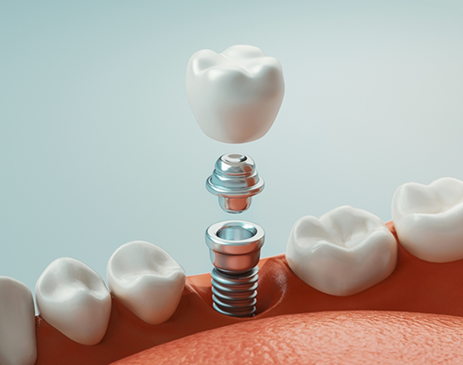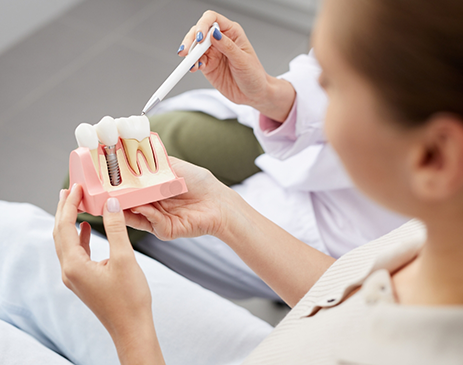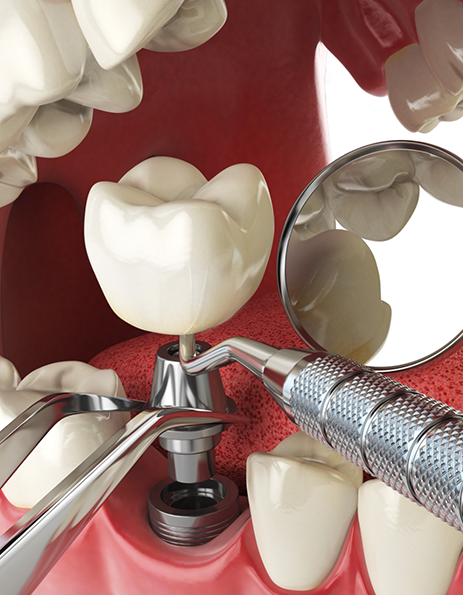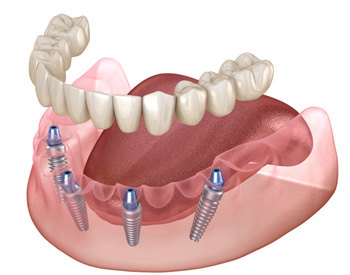Dental Implants Fort Smith
Advanced Tooth Replacement That Lasts
Neglecting treatment for tooth loss can lead to significant dental problems related to your jawbone and existing teeth. It can also become troublesome for your aesthetics and overall well-being. Fortunately, Dr. Harper and Dr. Cooper can mitigate these issues with dental implants in Fort Smith. We offer zirconia and titanium options as well as implant dentures and All-on-4, and we can complete this whole process in-house. We’ll help determine which solution you need, so don’t wait any longer. Call us to schedule your consultation today.
Why Choose Harper Dental for Dental Implants?
What Are Dental Implants?

Dental implants are permanent tooth replacements that can be made from biocompatible materials like titanium or zirconia. They’re placed within the jawbone and create a foundation that supports a custom-made crown, bridge, or denture. An implant’s ability to restore the root of a missing tooth makes it drastically different than other solutions (i.e., traditional denture or fixed dental bridge), and its longevity allows you to enjoy your new smile for decades as opposed to only a few years.
Zirconia vs Titanium Dental Implants

Titanium dental implants are typically composed of two parts: the implant screw, which replaces the tooth root, and an abutment, which connects the screw to the restoration. Because each portion of this two-piece system can be implanted individually, titanium implants can be inserted deeper into the bone. These parts are often installed at different stages. Zirconia implants usually have a single piece, though - meaning the treatment can be finished in a single session.
Both dental implant materials offer distinct advantages and disadvantages. Our team will help you choose the best material based on your requirements and preferences.
The 4-Step Dental Implant Process

There are multiple steps required when placing dental implants, each equally important if placement is to be successful.
- Initial Consultation – You will meet with Dr. Harper or Dr. Cooper to discuss your candidacy for dental implants before undergoing a thorough examination. This will determine if you need preliminary treatment before having your implants surgically placed within your jawbone.
- Dental Implant Surgery – Since the surgical placement is performed in-house, we will administer local anesthesia before placing each implant post into its designated spot. These areas will be determined beforehand with the help of our CT/Cone Beam Scanner.
- Osseointegration/Abutment – After returning home to recover, your dental implants will need to fuse with the existing bone in a process known as osseointegration. This can take 4-6 months. You will then receive your abutments (if you have titanium implants), which will hold your restoration in place.
- Delivery of Your Custom Restoration – The final phase of treatment is having your custom restoration attached to your implant posts. This will create your new smile, and you can begin to enjoy the many benefits these prosthetics have to offer.
Benefits of Dental Implants

Replacing missing teeth with dental implants offers a multitude of benefits that cannot be achieved with traditional dentures or a regular fixed dental bridge. What you will discover is:
- Dental implants can last 30 years or longer, with some patients even reporting a lifetime of use.
- Dental implants stimulate the jawbone by mimicking the function of a natural tooth root, which minimizes the risk of bone resorption and facial sagging.
- Dental implants are easy to maintain and do not require specialized instruments or products to keep them clean.
- Dental implants allow you to eat all your favorite foods because these prosthetics act just like regular teeth and the implant posts assist with chewing power.
- Dental implants boost your confidence because you will once again be able to enjoy life with a full, complete set of teeth.
Who Dental Implants Can Help

Good news: dental implants aren’t just for patients who are missing one or two teeth. In fact, they can help patients who are missing an entire arch of teeth or don’t have any of their natural ones left! So, no matter how mild or severe your case is, don’t hesitate to schedule a consultation with our team at Harper Dental if you are interested in restoring your smile with dental implants.
Who Is a Good Candidate for Dental Implants?

Before we can establish if you’re a good candidate for dental implants in Fort Smith, we need to complete a comprehensive oral exam, review your medical and dental history, and learn about your lifestyle. With all of this information, we can determine:
- If you have sufficient jawbone density
- If your gums are healthy
- If you’re in good overall health
- If you’re willing to commit to good habits
- If you’re able to break bad habits, like smoking
Important reminder: If you’re not a candidate for dental implants at your initial consultation, don’t get discouraged. Most of the time, we can provide the necessary preliminary care first, like gum disease treatment, so a healthy, complete, and beautiful smile isn’t out of reach for long.
Missing One Tooth

While one missing front tooth can take a serious toll on your self-esteem and speaking patterns, a missing molar can make it difficult to eat a healthy, well-balanced diet. The good news is that dental implants can fill the open space in your smile, benefiting your confidence, speech, and diet in the process. If we determine that this is the best tooth-replacement solution for you, then we will surgically insert the implant into your jawbone before securing a custom dental crown in place.
Missing Multiple Teeth

If you are missing multiple teeth in a row or several in an arch, you have a few options, including dental implants. If we decide together that this is the best tooth-replacement solution for you, then we will create your custom restoration to ensure the final result is a strong bite, pristine oral health, and a beautiful smile. We’ll also review proper care and maintenance so you can enjoy the results for 20+ years!
Missing All Teeth

If you are missing all of your teeth, traditional dentures are no longer the only solution. With implant dentures, we can secure your restoration in place with several dental implants. Not only will this prevent uncomfortable movement and slipping, but it will also provide you with a strong bite. One of the best parts is that the dental implants stimulate your jawbone, which prevents bone loss while also preserving your youthful appearance.
Maintaining & Caring for Your Dental Implants

Your new dental implants have the amazing potential to help keep your smile complete, strong and healthy for a lifetime! However, that depends on how well you take care of them. If you don’t protect your new smile from damage and infection, your dental implants could fail or need to be replaced. However, the great news is that with a few simple precautions and healthy habits, you may be able to enjoy your new prosthetics for a lifetime!
Make Oral Hygiene a Priority

Even though your new dental implants cannot get cavities like real teeth can, it is still important to practice excellent oral hygiene. That’s because your smile is not immune to oral health issues like gum disease, which could cause your dental implants to fail. Thankfully, you can care for your restorations just as you would your real teeth: by brushing your teeth twice a day, flossing daily, and visiting your dentist every six months for your regular dental cleanings and check-ups.
Eat a Healthy Diet

The great news about dental implants is that unlike other types of restorations, you can use them to once again enjoy a full, nutritious diet. However, be aware that overindulging in foods that are hard, sticky, or sugary may be problematic. Thus, be sure to stick to foods that are packed with calcium and vitamin C to help keep your jawbone healthy and strong.
Break Bad Habits

Unfortunately, some bad oral habits can cause your dental implants to break or fail. Do your best to quit smoking or using tobacco products, as these can slow healing and encourage infection. Furthermore, be careful not to use your teeth (both real and prosthetic) as tools, and never chew on hard objects, as this can damage your restorations.
Protect Your Dental Implants

Your dental implants are extremely strong and durable, but they’re not indestructible. Thus, if you are an athlete, always wear a sports mouthguard to protect them during sports. If you have bruxism (teeth grinding) be sure to protect your smile with a mouthguard to reduce excessive wear and tear.
Schedule Regular Dental Checkups

The American Dental Association recommends you visit your dentist every six months for regular dental cleanings and check-ups. Even if you have no remaining natural teeth, these appointments can help your dentist monitor your dental implants and detect any issues as soon as possible.

